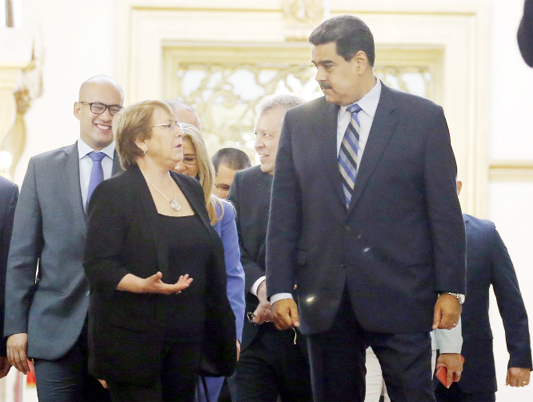
AP, Geneva :
Venezuela’s government registered nearly 5,300 killings during security operations last year linked to cases of “resistance to authority,” the U.N. human rights chief reported Thursday, denouncing a “shockingly high” number of extrajudicial killings.
Michelle Bachelet’s report focusing on the last 18 months follows her trip to the troubled South American country last month and draws upon over 550 interviews conducted by her office with rights defenders, victims, witnesses of rights violations and other sources. She and her teams held nearly 160 meetings with state and other stakeholders. Bachelet, a former Socialist president of Chile, herself met with Venezuelan President Nicolás Maduro last month.
Authorities in Maduro’s government tallied 5,287 killings during security operations that were classified as cases of “resistance to authority,” plus another 1,569 this year through May 19, the report said. It also cited separate figures by the Venezuelan Violence Observatory of at least 7,523 such killings of that type last year, plus at least 2,124 from January to May this year.
“The incidence of alleged extrajudicial killings by security forces, particularly the special forces (FAES), in the context of security operations has been shockingly high,” Bachelet’s office said.
Interviewees consistently referred to FAES as a “death squad” or “extermination group.” NGOs say the FAES is responsible for hundreds of killings.
Among more than 20 recommendations on issues like ensuring media freedom and providing proper health care, she called for disarming and disbanding pro-government armed groups known as “collectivos.”
The report from an ostensibly impartial observer like the United Nations comes as Venezuela’s internal turmoil of recent years has divided the international community. Over 50 countries, including the United States, many South American neighbors of Venezuela and European nations, have recognized opposition leader Juan Guaidó as Venezuela’s legitimate leader, even though Maduro remains in power.
Maduro’s government blasted an “openly biased” account that presented a “distorted version” of actual conditions.
“There are countless inaccuracies, errors, facts taken out of context and false assertions,” it said.
Venezuelan officials insisted the report overlooked visits by U.N. observers in March to jails, hospitals, public housing programs and distribution centers for medicine and food, and said it “omits in its entirety the achievements and advances achieved” by the country in the field of human rights.
Venezuela’s government registered nearly 5,300 killings during security operations last year linked to cases of “resistance to authority,” the U.N. human rights chief reported Thursday, denouncing a “shockingly high” number of extrajudicial killings.
Michelle Bachelet’s report focusing on the last 18 months follows her trip to the troubled South American country last month and draws upon over 550 interviews conducted by her office with rights defenders, victims, witnesses of rights violations and other sources. She and her teams held nearly 160 meetings with state and other stakeholders. Bachelet, a former Socialist president of Chile, herself met with Venezuelan President Nicolás Maduro last month.
Authorities in Maduro’s government tallied 5,287 killings during security operations that were classified as cases of “resistance to authority,” plus another 1,569 this year through May 19, the report said. It also cited separate figures by the Venezuelan Violence Observatory of at least 7,523 such killings of that type last year, plus at least 2,124 from January to May this year.
“The incidence of alleged extrajudicial killings by security forces, particularly the special forces (FAES), in the context of security operations has been shockingly high,” Bachelet’s office said.
Interviewees consistently referred to FAES as a “death squad” or “extermination group.” NGOs say the FAES is responsible for hundreds of killings.
Among more than 20 recommendations on issues like ensuring media freedom and providing proper health care, she called for disarming and disbanding pro-government armed groups known as “collectivos.”
The report from an ostensibly impartial observer like the United Nations comes as Venezuela’s internal turmoil of recent years has divided the international community. Over 50 countries, including the United States, many South American neighbors of Venezuela and European nations, have recognized opposition leader Juan Guaidó as Venezuela’s legitimate leader, even though Maduro remains in power.
Maduro’s government blasted an “openly biased” account that presented a “distorted version” of actual conditions.
“There are countless inaccuracies, errors, facts taken out of context and false assertions,” it said.
Venezuelan officials insisted the report overlooked visits by U.N. observers in March to jails, hospitals, public housing programs and distribution centers for medicine and food, and said it “omits in its entirety the achievements and advances achieved” by the country in the field of human rights.

